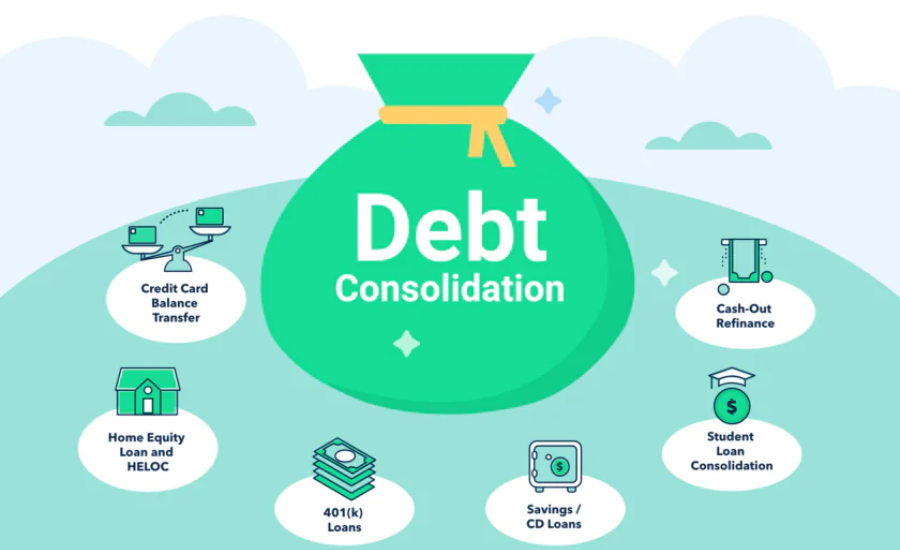Debt consolidation loans provide hope to those drowning in financial obligations. This post will explain debt consolidation loans, its pros and pitfalls, and how to make an informed decision.
1. Understanding Debt Consolidation Loans
Debt consolidation loans assist people manage and simplify their debts. They include taking out a new loan to pay off numerous obligations with one monthly payment. A debt consolidation loan aims to minimise your monthly payment and maybe lessen your debts’ interest rates, making financial management easier.
2. Debt consolidation loan operation
Debt consolidation loans work simply:
Assess Your Debts: List your credit card, personal loan, medical, and other debts.
Select Loan Type: Choose a debt consolidation loan that suits you. Details in the next section.
After choosing a loan type, apply for a debt consolidation loan from a trustworthy lender. The lender will base your loan amount and interest rate on your creditworthiness.
Use the Loan to Pay Off Debts: If accepted, get the loan. Completely pay all your debts with this money.
Monthly Payments: Your debt consolidation loan will now have one easy monthly payment instead of many ones.
3. Debt Consolidation Loan Types
Borrowers can choose from different debt consolidation loans:
Personal loans are unsecured and can be used for debt restructuring. Fixed interest rates and terms make monthly payments easier to budget.
Secured Loans: Home or car collateral backs secured debt consolidation loans. These loans have lower interest rates but risk losing collateral if you default.
Credit Card bill Transfer: Some credit cards offer low or 0% introductory APRs for bill transfers. Transferring high-interest credit card balances to lower-rate ones can assist consolidate and pay off debt.
Home equity loans or lines of credit: Homeowners can use their equity to consolidate debt. If you default on these loans, you could lose your home despite lower interest rates.
4. Debt consolidation loan pros
For financial relief, debt consolidation loans offer many benefits:
With a single monthly payment, you may streamline your expenses and avoid missing deadlines.
Cheaper Interest Rates: Your consolidation loan may have a cheaper interest rate depending on your creditworthiness, saving you money over time.
Fixed Monthly Payments: Personal loans with fixed interest rates and terms are easier to budget and plan.
Paying off bills with a debt consolidation loan might improve your credit score.
Debt payback Strategy: Debt consolidation loans require a clear debt payback strategy, making debt elimination faster.
5. Drawbacks of Debt Consolidation Loans
Debt consolidation loans have pros and cons:
After consolidating your debts, you risk amassing additional debt if you utilise credit carelessly.
Possible Higher Total Interest Costs: Your consolidation loan terms and existing debt interest rates may result in higher interest payments over time.
Fees and prices: Origination fees and prepayment penalties can increase debt consolidation loan prices.
If you can’t make payments on a secured loan like a home equity loan, you risk losing your collateral.
Credit Score Impact: A debt consolidation loan may lower your credit score initially, but continuous payments should increase it.
6. Debt consolidation: right for you?
Your financial condition and goals determine if debt consolidation is best for you. Consider these factors:
Debt consolidation can simplify payments and lower interest rates for several high-interest obligations with different due dates.
Interest rates: See if a consolidation loan has a cheaper interest rate than your debts.
Credit Score: Your creditworthiness affects your interest rate. A higher credit score might improve loan terms.
Honesty about your finances is financial discipline. Debt consolidation won’t work if you keep borrowing.
Consider your long-term financial goals. Debt consolidation might help you become debt-free if it fits your plan.
7. Debt Consolidation Loan Application
If you feel debt consolidation is correct for you, follow these steps to apply for a loan:
Get Your Credit Score: To assess your creditworthiness, request your credit report and score. Before applying, dispute credit report errors.
Research lenders: Compare bank, credit union, and internet options. Look for good interest rates and terms.
Gather Financial Documents: Show your income and financial security through pay stubs, bank statements, and tax returns.
Complete Application: Submit a loan application to the lender. Give correct debt, income, and employment information.
Review Loan Offers: Carefully review loan terms, interest rates, and fees. Select the most suitable offer.
Post Your Application: Complete the lender’s application, which may include a credit check and financial verification.
Await Approval: The lender will assess your creditworthiness and application to determine loan eligibility.
Use the Loan to Consolidate Debt: If authorised, pay off your debts.
8. Tips for Debt Consolidation Success
To maximise debt consolidation success, consider these tips:
Budget: Make a precise budget to track all your expenses and make regular consolidation loan payments.
Spend Less: Cut unnecessary expenditures to pay off debt.
Use discipline to avoid new debt while paying off your consolidation loan.
Build an Emergency reserve: Avoid credit cards for unforeseen bills by having an emergency reserve.
automated Payments: Never miss a consolidation loan payment with automated payments.
Monitor Your efforts: Track your debt reduction efforts and alter your budget as appropriate.
9. Alternatives to Debt Consolidation
Debt consolidation loans can assist manage debt, but not everyone should use them. Consider these options:
Debt Management Plan: Credit counselling agencies can negotiate reduced interest rates and monthly payments with creditors.
You may be able to negotiate a lower debt settlement with creditors.
Bankruptcy: A last option, bankruptcy can relieve excessive debt, but it has long-term credit effects.
DIY debt repayment schemes like the Snowball or Avalanche Method prioritise and aggressively pay off one obligation at a time.
Conclusion
Debt consolidation loans can help people manage their money and repay debt. However, you must analyse the pros and cons, examine your finances, and commit to smart financial management.
To succeed with debt consolidation, research lenders, compare loan offers, and set a budget. Debt consolidation requires financial discipline and effort.
Debt consolidation or other debt reduction alternatives aim to give you financial freedom and peace of mind.
